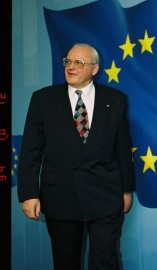
“And so the question arises whether Germany can still be referred to unconditionally as a parliamentary democracy at all, because the separation of powers as a fundamental constituting principle of the constitutional order in Germany has been cancelled out for large sections of the legislation applying to this country.”
…
“But the federalists are also correct with their diagnosis of the problem, that the political decision-making structures of the EU are inadequate, intransparent and above all, not very democratic, given the extent of their influence which today covers practically all aspects of social life. Why is this?
The Council of Ministers plays a central role here. On the one hand, it is made of up the corresponding ministers from the Member States, i.e. representatives of the executive; on the other hand, it makes up part of the European legislative, formally along side but in fact with priority over the European Parliament. In other words, the Council is hybrid by nature: Against the fundamental principle of the separation of powers, the essential European legislative functions lie with the members of the executive.
While this may have been acceptable during the initial phase of European integration, when dismantling trade restrictions was the prior aim, today Brussels is in possession of very extensive positive regulation and, above all, regulating competencies, cue: 84%. In this context, the hybrid nature of the Council of Ministers is definitely a problem.”
Published in the “Welt am Sonntag”, 14 January 2007. Read the whole article here.
